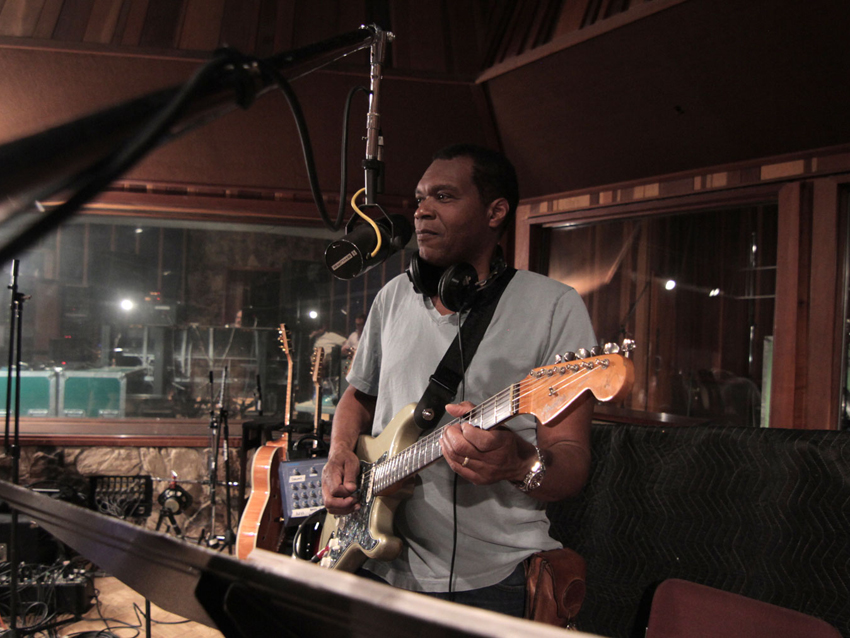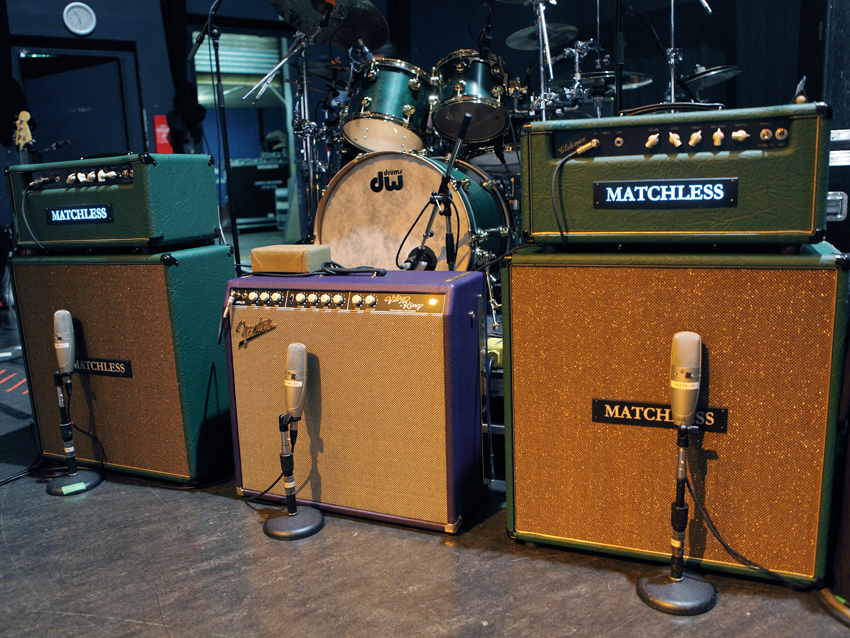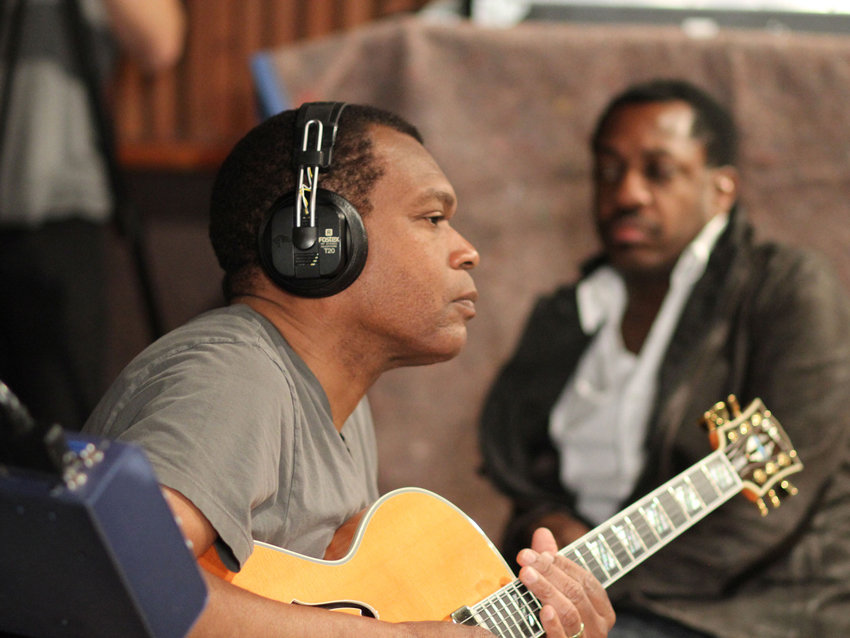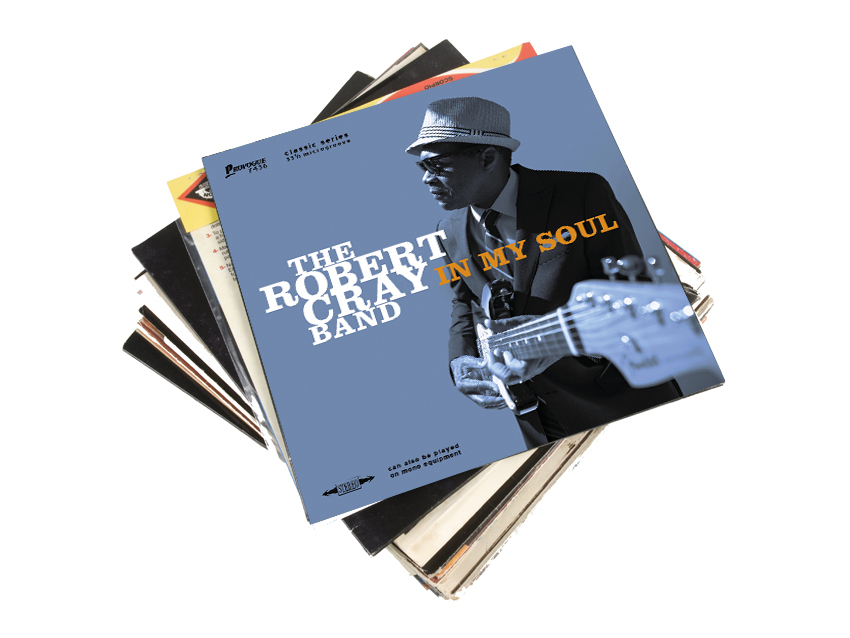Robert Cray hints at a new signature Strat
Bluesman talks new album In My Soul

Robert Cray hints at a new signature Strat
60 DAYS OF STRAT: Robert Cray, multi Grammy Award winning blues and soul artist, is celebrating 40 years of his band in 2014 with a string of tour dates and a brand new album, In My Soul.
His vocal and guitar styles remain as compelling and distinctive as ever on the new release, produced by veteran musician/musical director and long-time friend, Steve Jordan.
We caught up with Cray to find out more about In My Soul, 40 years on the road and a potential new Fender collaboration…
You worked with Steve Jordan as producer on the new record – had you worked together since Take Your Shoes Off (1999) and Shoulda Been Home (2001)?
“No, but we’ve been friends ever since those records, and in fact I’d met him years before then, too. I’d see him here and there and I thought it would just be a great idea to get us back together. We’ve had so much fun – we like and appreciate a lot of the same music and when you work with Steve, he’s like another member of the band. He becomes that in the studio; really hands on and gets everybody involved.”
How did working with Steve differ from working with Kevin Shirley from the last record?
“It’s a different process. My relationship with Steve, I mean Steve is really into sound, and you can hear that sonic difference between the two albums [In My Soul and Nothin’ But Love, 2012]. Also, part of that was the engineer, Niko Bolas. Steve had always worked with Niko, or with Don Smith whenever we worked together and their thing is pure sound, with Steve using vintage gear and microphones. It starts from the drums and works its way up so yeah, a different process.”
Les Falconer is now playing drums and Dover Weinberg is back playing keys – how did this new band lineup come together?
“Well Les has been with us for just over a year now and he’d asked me at one point, ‘If you ever need somebody…’ so at the end of 2012 I made the change. And then more recently, I called Dover back too [Weinberg played with Cray 1974-1979]. It was great, it’s new energy and it just makes it different: change is good.”
Les even sings, right?
“I’d mentioned to Steve before we went into the studio that Les could sing, so he held that in his head. We were close to finishing the record and Steve asked Les to come into the vocal booth and asked him to sing the first verse of Nobody’s Fault But Mine. Les had never done that before, but I’d watched him… I mean Les used to play drums with Keb Mo, and I’d watched him sing background with Keb, and I thought, ‘Man, he can sing!’”

New Strat on the way?
Is the record specifically soul influenced? We hear that in all of your music, but was there some extra soul inspiration in this record?
“Working with Steve, he goes wholeheartedly into anything whether it’s rock, or blues, or whatever. I know that if we tackle something in the soul vein, like with that Otis Redding song [Nobody’s Fault But Mine], he’s in there 100 per cent. He was just throwing out ideas of cover tunes, and that was the first.
"The second was Your Good Thing’s About To Come To An End, the after that it was the band and myself bringing in material. Nobody knew, and nor did we have a concept of the album, it was just about bringing in the songs. Everybody brought in something that was R&B flavoured and the record just took its own form; on this one there’s more soul than anything else.”
In the promo video on You Tube, you’re playing a Strat with a pearloid pickguard – is that a new guitar?
“That’s an idea for another model that we’re working on… I was sent a pearloid pickguard that I put on one of my guitars.”
Is that hush-hush at the moment then?
“Um yeah, kinda’. [laughs]. But I mean it is in the video…”
So there’s something happening this year with Fender?
“I would think so, yes [laughing].”
Your Good Thing – the Strat sound in that sounds like the amp is really far mic’d – we know that’s something you like to do…
“Yeah, there were mics placed in three different locations in this one room where we had all the amplifiers. The way the solo sounds in that song, it sounds like it was the far mic, getting more of the room sound with the amp cranked.”
And what were those amplifiers?
“It was either the [Fender] Super Reverb, or the Matchless [Clubman]. But as usual we had a selection of amps for the record; the [Fender] Vibro King, Super Reverb, a Princeton, the Matchless and I brought in two Magnatone amps, the 260 and the 280, my vintage ones. The vibrato comes from those amps. So we would switch amps and guitars and look for sounds.”

Soul influences
Hip Tight Onions is wonderful! Is that right it’s the first instrumental that you’ve done?
“As far as I can remember I think it is. It’s written by Richard [Cousins, bass] and his friend Hendrix Ackle. It’s a tribute to Booker T and the MGs.”
The guitar is super loose in that, dare we say quite a way out of tune – presumably there was a discussion about that as it was happening?
“I tell you what, when I heard the playback, I was like, ‘Wow – what happened to that guitar?!’ [laughs]. And Steve said, ‘Man that was just happening – if we have to go back in and cut it, get the guitar back in tune, but I don’t think we’re going to get the same kind of performance that you just got.’
“It was the first track that we did. Steve came into the room and he conducted us. He was dancing to the groove of it. I didn’t have my headphone mix turned up, and I could just about hear the amp enough to play. We were playing around it for 15 minutes or something to get into the groove and Steve just said, ‘We’re going to cut it right away!’ I couldn’t hear that the guitar was way out of tune.
“It was a brave call to keep it, like during the mixing I was saying, ‘Steve?’ but eventually I settled in and I could hear exactly what he was talking about. See with Steve, he hears that stuff right away.”
What Would You Say is the only song on the record that’s not an obvious love or relationship song. Can we ask what inspired that tune?
“Current events, and y’know, just going to the market, shopping, and seeing somebody stood there with a cardboard sign asking for work, or food. Thinking about all that, how it is for those people, y’know. Also reading the newspaper and watching TV about what’s going on in Syria, especially when they had the gassing, and the images of the kids and all that. It’s just sad – current events – so I grabbed an acoustic guitar in my little practise room and that just came out.”
Deep In My Soul, the Bobby Bland song – what made you choose to record that for the new record?
“I grew up listening to Bobby Bland because my mother was a huge fan. We played down in Mississippi there, down in the Delta and Bobby Bland’s wife came to see us. She’d been to see us a couple of times in fact, I mean she was a fan of ours, of me, which I just could not believe! Then we were playing in Memphis about a year and a half ago and Rodd Bland, Bobby’s son, Mrs Bland and Bobby were all sitting on chairs on stage to come and see us. That was a big honour!
“Also when BB King’s Museum opened, Bobby Bland was there; Keb Mo and I sat in with Bobby and BB, and they let me sing! So there I am sitting between Bobby and BB and I'm singing!? It was a dream come true.
“Then when Bobby passed away, it seemed appropriate to me to do something of his. I went through the records, and I didn’t want to do the traditional Further On Up The Road or whatever. Being a fan for so long, his music goes deeper than the most popular tunes, but when I heard the opening chords of Deep In My Soul, I decided to give it a try.”

In My Soul
You’re coming to the UK in May to tour, and on the posters it says 40 years of the Robert Cray band – congratulations! How does it feel to have been doing this all these years, and to still be enjoying plenty of success?
“It doesn’t feel like 40 years! The way it happened was that Richard Cousins [bass] and I had been in a band in Tacoma, Washington, doing a few gigs. Then a good friend of Richard’s who played drums – his name was Tom Murphy – had moved down to Oregon. Richard said, hey, let’s go down to Eugene, Oregon and we can do some playing. I’d just turned 21 and Richard was 19 and we just took off!
"We were going to play rhythm and blues; Elmore James and James Brown and Bobby Bland and all that stuff… All we wanted to do was have a band and play music. So after 40 years of doing that, I mean I don’t think we had any huge expectations, but man, a lot of things have happened. It’s great, what can I say?”
Is it possible to pick out two or three highlights over those 40 years that have meant most to you as a musician?
“Being able to spend time around Albert Collins and getting to back him up. He played my high-school graduation party in 1971!
“Also to have been around John Lee Hooker; we did a lot of touring with him and John Lee was a really good friend. To have the opportunity to sit in with Muddy Waters, meeting Eric Clapton…”
Do you ever get used to it – presumably there’s part of that 21 year old kid still there pinching yourself?
“I wouldn’t say that I’m used to it. Any time I’m around these people, I still have the highest respect for them; I’m still in awe. And then when you do events like the Crossroads Music Festival with Eric and everybody else who’s there, you have to pick your chin up off the floor [laughing].”
Robert Cray’s new album ‘In My Soul’ is released by Provogue Records. Cray’s UK tour starts Friday 3rd May.
Tickets are available from Ticketmaster: 0870 534 444 and See Tickets: 0871 220 0260.
For more information visit the official Robert Cray website.